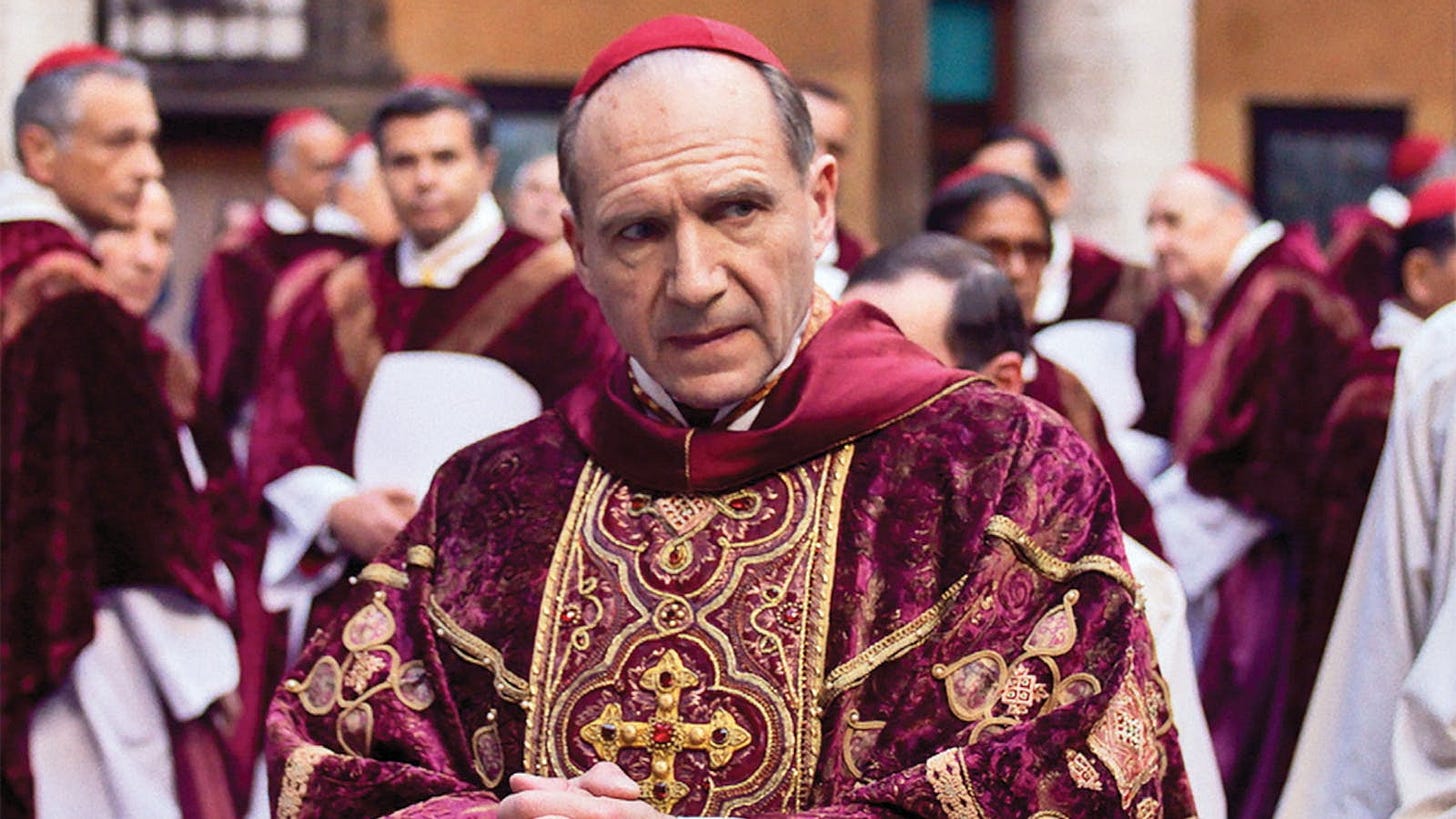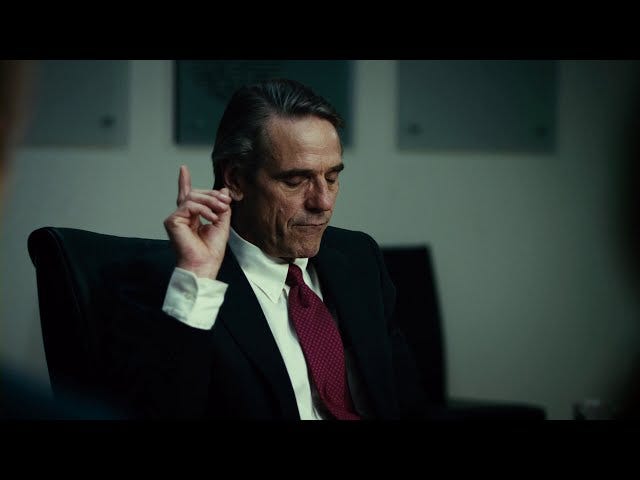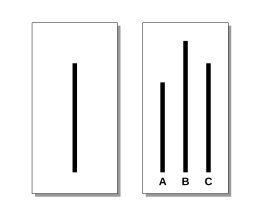@4 The Path Less Travelled
Timeline: Election of the Year → The Same Life → The First, The Patient and The Brave → Concluding Thoughts
Election of the Year
2024 was described as the largest election year in history. In case you've been living in a log cabin away from newspapers and the internet, there have been votes in the US, UK, India, France, Japan, Pakistan, and Iran. But the one that was the most exhilarating election I witnessed was of a fictional pope in the film Conclave.
When the pope dies, the college of cardinals is convened to vote on their church's successor. They are to be locked ('cum clave' = 'with keys') in the Sistine Chapel to vote on who will take the highest office of faith and spirituality in the world.
It's a highly unique process, both in terms of tradition and election mechanism. Unlike typical party elections, where there is effectively only a single round of voting and the candidate or party with the majority of votes 'wins', the next Pope requires a two-thirds majority. And since there can only be one Pope, there is no coalition to be formed to get the votes above the required threshold. What you get instead is a potentially multi-round, deadlocked voting process, with tribes of cardinals coming around their ideological representative. It is a slow and constant negotiation between ideals in search of a middle ground.
The results of each round of voting during Conclave get announced. If the pope has not been elected, the round instead has served as an initial polling of where everyone stands. In the film, there are at least 4 real contenders for the empty throne, each with pretty even initial support. That means between the poll and the final round, almost 50% of voters need to change their minds. Contrast this to the US presidential election. Polls typically estimate that under 15% of voters are undecided going into the final weeks. That makes it challenging to predict who the fictional next pope will be, not something I would wager $50 million on.
Uncertainty is the central theme of the film, and not just because the competition is hard to call. Firstly, the period of conclave requires all cardinals to be sequestered from the outside world, to be cut off from the flow of information. This lack of external validation sows the seeds of doubt. And secondly, we are reminded that the nature of faith is the same. A prayer is a one-way conversation, met with the unnerving silence of God. In Cardinal Lawrence's homily prior to the proceedings, he reminds the college that it is their uncertainty rather than their certitude in God that has brought them together:
If there was only certainty and no doubt, there would be no mystery and therefore no faith.
The Same Life
Common life paths are vetted by the sheer number of people who have trodden down that road before. They can create predictable outcomes. But these outcomes are usually safety nets. You can have a degree of confidence in the quality of life you will have in the future if you decide to become a lawyer, an accountant, or a consultant. They raise the floor.
Consider the decision to get a university degree. A university education makes you more desirable to employers. Virtually all young people are becoming university graduates in the US. As television host Conan O'Brien jests in his 2011 Dartmouth commencement speech, "Today, you have achieved something special --- something only 92 percent of Americans your age will ever know: a college diploma... you now have a crushing advantage over 8 percent of the workforce". As adoption increases, the benefits get distributed spread around more hands: you had an edge going to university when only 10% of the population did, but that edge is blunt now that 92% have a degree. You eventually get to the point where everyone converges to making the same decision in life.
In order to raise the ceiling, you must be prepared to go where few of your peers have gone before and be prepared to confront uncertainty. Here are three cohorts of ceiling raisers.
The First
You may be the first generation to discover the path. You may have heard stories of other similarly decorated trails, but yours is of a totally uncharted corner of the map, and you are the first to walk over its terrain. These new opportunities have little to no datapoints you can reason over. Every step is a new experiment, and every day a deluge of new findings.
Out of all the cohorts to explore this path, the first are maybe the luckiest. Whatever reward lies ahead has been untouched, and there is also the possibility that it is not a Herculean task to reach it.
'There are three ways to make a living in this business: be first, be smarter, or cheat. Now, I don't cheat. And although I like to think we have some pretty smart people in this building, it sure is a hell of a lot easier to just be first' - Jeremy Irons in Margin Call
Your reward is related to your standing in the queue: the earlier you are, the greater the payout. Once the game is afoot, it is a rush to the front. These frenzied sprints define historical periods:
Westward expansion in the US
The Californian gold rush
The Texas oil boom and Pennsylvanian oil rush
The Dot Com and AI Booms
They mark the start of a shift towards a new way of life. Nascent industries sprout up to service the new kind of demand, which means there is not just one queue you can wait on. You could get rich during the gold rush by mining for gold or by selling the picks.
The Patient
The first generation who tried may have failed. Anyone who now approaches the road is warded off by an ominous pile of bones. It is as if a wise sage had come years earlier and cast lots to decide if he should continue, only to be gripped by a terrible vision of what lies ahead that leaves them fleeing from the scene.
Although it feels like AI is novel, we are in the third or fourth cycle and are recycling many of the fundamental insights from earlier cycles that were at one point abandoned or had gone out of fashion. Neural networks trace their origins as far back as 1943 but struggled to get traction due to limited data availability and compute. But over 50 years later, these challenges were overcome, and the approaches were re-explored with new fervor and unprecedented success.
Do not infer that because an option is unfavorable at one moment it will remain unfavorable forever. There are many circumstantial factors for why it failed the first time round that may cease to be the case in the future:
It wasn't the right time - you may struggle to sell China and Ming dynasty vases in London during the height of the Blitz.
It was too soon - the supporting technology and infrastructure weren't sufficiently developed. I don't think Da Vinci could have gotten to the moon even if he had tried to.
It was not the approach but the team that was the problem.
This first kind of patience is about waiting for the right time to take action. There is a second kind of patience that comes from perseverance and consistent practice. Steve Martin's great wisdom of "being so good they can't ignore" requires extreme commitment. You need to persist at one specific craft over many years, something that few have the grit or willingness to do. Not only is the journey often solitary and monk-like, but so is the destination. The pack gets thin the closer you are to the top, and there aren't many that can relate to your story.
The Brave
Agreeing and conforming is psychologically easy. Disagreeing is difficult. We are not wired to deviate from the crowd, and the crowd has tactics like shame and peer pressure to pull us back in. In Solomon Asch's famous conformity experiment, the subject was placed in a room with actors and asked to pick which out of two lines was the same length as the reference line. The actors were told to unanimously answer incorrectly. The discomfort of answering differently from the crowd swayed over 30% of test subjects to answer incorrectly.
Orwell and other iconoclastic thinkers have convinced us of the evils of 'groupthink'. But let's not forget that as individuals, we do not have all the answers, and it may be worth outsourcing part of our thinking to others. This could be to experts, to the wisdom of the crowd, to generational wisdom, and growingly to ChatGPT. The failure mode is when these ideas or 'rules' get accepted based on the perceived adoption of others, rather than merit. And all of a sudden, these old rules may become invalid, and we won't even notice.
Step forward The Brave. These are the courageous that voluntarily hold the outsider, unconventional, or contrary position. Contrarians come in two forms:
The Observant Analyst: They were the kid in school that always asked the question 'but why?' to every answer the teacher gave, until the teacher gave up; they were still unsatisfied. They question everything and are restless truth seekers. When they find that the evidence does not accord with what people are saying, they become whistleblowers to the conspiracy. Examples: Michael Burry, Bob Woodward, and Carl Bernstein, Copernicus
The Naive Visionary: They were the kid in school that always asked the question "but why not?" They have an idea for how the world should be, and don't pay much attention to how it already is. This ignorance to what others perceive as impossible empowers them to give the challenge a go. They find the world is much more malleable than others believe. Examples: Steve Jobs, Daniel Ek, Elon Musk, Jeff Bezos.
If you want to know what sort of contrarian you might be, answer the question, "Is truth created or discovered?"
We have drawn a line that divides life paths into 'safe' and 'risky'. People who cross the line are called risk takers. Those who stay behind are risk averse. But although the safe side has no more tall grass for snakes to hide in, its just as vulnerable to natural disasters as the risky side. Financial crises, war, pandemics. These all have the capacity to totally upend the lives of traditional career-seeking employees and ambitious entrepreneurs alike.
Erase the line. Instead, seek out where few have been willing to go before. Stare deep into the undergrowth, and once you hear your name being called, go all the way.
But before you go, carry with you a little from all three of our path voyagers: the agility and alertness of The First, the determination and hard work of The Patient, and the chutzpah and measured self-assuredness of The Brave.






very profound thoughts. i like the variety of issues discussed.